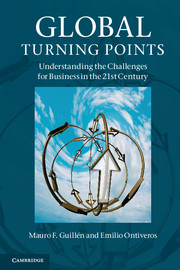Book contents
- Frontmatter
- Contents
- Illustrations
- Tables
- Preface
- 1 Welcome to the twenty-first century
- 2 A global economy out of balance
- 3 The rise of the emerging-market multinationals
- 4 The new demography
- 5 From dictatorship to democracy and failed states
- 6 A disparate world
- 7 The quest for sustainability
- 8 The global powers of the twenty-first century
- 9 Coping with uncertainty and complexity
- References
- Index
5 - From dictatorship to democracy and failed states
- Frontmatter
- Contents
- Illustrations
- Tables
- Preface
- 1 Welcome to the twenty-first century
- 2 A global economy out of balance
- 3 The rise of the emerging-market multinationals
- 4 The new demography
- 5 From dictatorship to democracy and failed states
- 6 A disparate world
- 7 The quest for sustainability
- 8 The global powers of the twenty-first century
- 9 Coping with uncertainty and complexity
- References
- Index
Summary
KEY GLOBAL TURNING POINT
For the first time since World War II there are more countries in the world affected by state failure than countries ruled by dictators. In general, there is a sharp decline in the legitimacy and capacity of the state in both developed and developing countries.
Perhaps the most striking way in which the twenty-first century differs from its predecessor has to do with politics, state fragility, and the nature of violent conflict. The historian Eric Hobsbawm (1994) argued that the twentieth century was a “short” one, stretching only between 1914 and 1991, and was characterized by an epic confrontation between dictatorship and democracy during World War I, the interwar period, World War II, and the Cold War. In the twenty-first century, by contrast, global political dynamics are unlikely to be dominated by the extent to which individual freedoms and political rights are observed. Rather, the problem on everyone’s mind will be failed states, i.e., countries in which central authority has broken down. The rise of international terrorism, the key form of violent conflict in the twenty-first century, is related to this breakdown of state authority.
Thus, in many ways the twenty-first century may end up vindicating Francis Fukuyama’s famous “end of history” thesis (1989) in that liberal democracy and free markets won the battle, although the modern state as the dominant form of political organization is not uniformly effective around the world, with major implications for the global economy, global trade, and the nature of conflict. Samuel Huntington’s (1993) premonitory analysis of the “clash of civilizations” seems to have become awfully descriptive of the new politics of identity and conflict in the twenty-first century, in which civil wars are less frequent than during the Cold War period, inter-state wars are even rarer, and the most dangerous and lethal conflict takes the form of terrorism. Democracy, while formally the dominant form of government, does not translate into free popular participation and viable opposition in countries such as Russia, Bolivia, Venezuela, Nigeria, and Pakistan, to name but a few, mostly because of the weakness of political and social institutions (Epstein and Converse 2008). Moreover, in spite of the spread of democracy, two billion people continue to live under authoritarian regimes, especially in Africa, the Middle East, South Asia, and East Asia.
- Type
- Chapter
- Information
- Global Turning PointsUnderstanding the Challenges for Business in the 21st Century, pp. 66 - 85Publisher: Cambridge University PressPrint publication year: 2012



